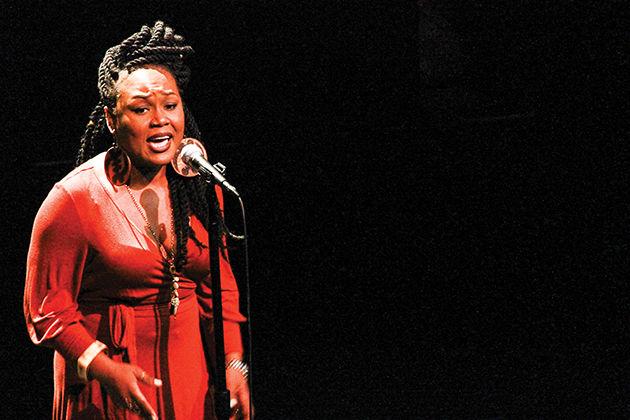Snapping, clapping and yelling filled the air in Downtown Bryan and Rudder Theatre this weekend during the fifth annual Texas Grand Slam Poetry Festival.
Forty-two poets from around the country gathered to compete in a two day event that ended Saturday with the first female winner in the competition’s history. First place this year went to Sha’kondria “iCon” Sibley, a competitor from Alexandria, La.
Slam poetry is a type of competition where poets have three minutes on stage to recite their own work. The performance is judged by a panel of five randomly selected audience members on a scale of one to 10. The middle three scores are then added up for the final score.
Jordan Cooley, Texas Grand Slam co-director and English senior, said the event, which is the largest annual poetry slam in the state, represents the poetry community well.
“These poets utilized their position on stage to get their message across, and I thought that was beautiful,” said Cooley.
Finalists competed for a $1,200 prize Saturday in three rounds with different poems each round. Participating poets used the stage as a platform to share their personal experiences. Topics ranged from sexual abuse and racial profiling to one poem involving a competitor’s appreciation for Whataburger.
Throughout the competition, Sibley, who slams barefoot, delved into variety of topics, from prejudice to the sexual abuse of a child. Sibley’s last poem called “Black Woman Speaks” was about her experience overcoming race and gender stereotypes.
“I feel like slam pushes me, I love the comradery of it, I love meeting different people,” Sibley said. “It has opened up a new avenue for me.”
One of the finalists, stage name “Glori B.,” slammed about her experience with struggling through depression, attempted suicide as well as the lack of people in her life she felt were willing to simply listen to her problems and not try and “fix” her.
Another poet, Xavier “CoolKid,” slammed about the social issues that he felt plagued today’s minority demographic. His poems spoke on topics such as racial profiling from the police and the struggles of Muslim communities.
“A lot of social issues, culture as far as being a Hispanic male — I like to write about questioning society’s norms,” the poet said.
“Rage Almighty,” another poet in the finals and a black man, slammed about how he feels when people constantly ask if they can touch his hair.
“I like the vulnerability in it. It’s so honest,” said Jessica Jungo, an audience member. “Some of them are really funny, but some are really deep.”
Each time a finalist was introduced the crowd scream words of encouragement like, “You got this,” “She may be small, but she is fierce” and, “You can do this.”
Just before the competitor would speak the crowd would become silent. Once words began to spill from the poets mouths, the crowd would again shout, snap and yell out at parts of the poem that were particularly impactful.
Cooley said no one should be afraid to share their experiences on stage and that Texas Grand Slam is known for its encouraging environment.
“To go up on stage and read a piece of art that is so personal, nothing is bad,” said Cooley. “Nothing should be booed or looked down upon because that took so much effort and so much courage to get up on stage.”










